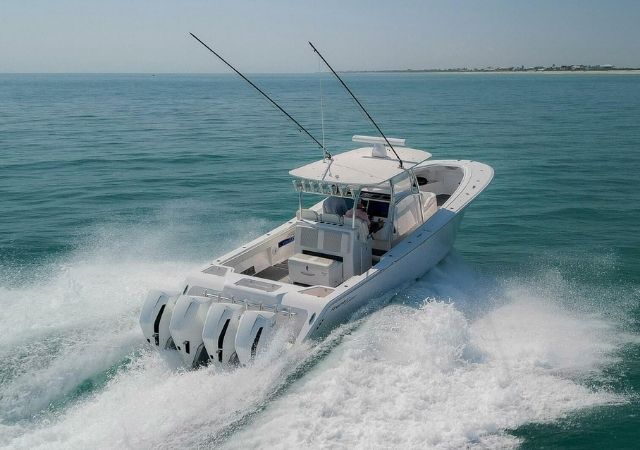Key Points
- Financing allows you to buy a boat now by spreading the cost instead of having to save up or tie up your money in one asset.
- There are several boat finance options available including secured loans, unsecured loans, home equity loans, and marine dealer financing.
- A good credit score will get you the best choice of lenders and terms.
- The length of boat financing agreements are between 4 and 20 years, with 5 to 10 being the most common.
- New boat financing is often the smartest way to finance a boat if you want lower rates and longer terms.
Owning a boat doesn’t have to be a dream requiring decades spent saving. In the same way that people buy houses using a mortgage, or buy cars or motorhomes on finance, boat financing is commonplace and readily available. It allows you to spread the cost of a boat over a certain number of years, fitting it in with your monthly budget.
Over the agreed period, you pay back the specified loan amount, with interest. The amount you pay back, how long the loan term is, and the interest rate will all vary depending on your needs and what the lenders are offering.
In this guide we’ll take an in-depth look at boat financing, find out what the options are, and how to navigate getting a marine mortgage. We’ll look at the types of boat financing, interest rates, and how to choose the best loan.

Why Finance a Boat?
Before deciding how to finance a boat, you should consider why you’re doing it rather than paying cash. Here are several reasons to consider financing:
a. Immediate ownership vs saving up
Financing a boat means you can own it now and start enjoying your boat right away, and not in years to come when you’ve saved enough money. Being able to buy a boat now means all those extra years of memories and adventures. It might be that you have a young family you want to share those experiences with, have seen the perfect boat for sale, or want to embark on a summer holiday.
b. Spread the cost sensibly
Even for those who have the funds to pay for a boat outright, financing allows you to save those funds and not have them tied up in one asset. These may be necessary for on-going maintenance, repairs, and the on-going costs of owning a boat. It can allow you to budget more easily, knowing exactly how much repayments will be each month and therefore spread the cost in a sensible and manageable way.
c. Credit benefits and investment opportunity
Timely repayments on a boat loan can positively impact your credit score, especially with longer-term loans. So, if you’re looking to strengthen your credit score while enjoying the boating lifestyle, then buying a boat on finance can be a useful way to do it. There may also be tax advantages to using finance rather than buying a boat outright such as interest deductibility in the US. Another thing to consider is that paying cash means tying up a large sum in a depreciating asset. Financing allows you to keep that money invested elsewhere, potentially earning more than the interest you pay on the loan.

What’s the Best Way to Finance a Boat? Types of Loans Explained
a. Secured boat loans (marine loans)
A secured loan involves using some collateral as security, and in the case of buying a boat, the boat itself would act as the collateral. In this instance, if you didn’t pay your monthly installments (known as defaulting on your loan), the lender could repossess the boat.
The benefit of taking out a secured loan is that they usually come with lower interest rates and higher lending limits as there is less risk to the lender. The downside is that if you default on your loan, you risk losing your boat.
b. Unsecured personal loans
An unsecured loan doesn’t require any collateral, which means there is no risk to you losing your boat if, for any reason, you can’t repay your monthly loan. It’s important to note that it would affect your credit score though.
As there is more risk to the lender with an unsecured loan, you are likely to be offered lower lending limits and higher interest rates. However, it does mean you are freer to use the loan money as you wish, which might include equipment for the boat, repairs, or the purchase of a trailer.
c. Home equity or HELOC
Unlike a personal loan, a home equity loan uses your house as collateral against the money you are borrowing. It is essentially a type of second mortgage, and because it is secured, you will usually get better interest rates and higher lending limits. Of course, if you miss payments and ultimately default on your loan, the risks include late fees, damaged credit scores, and even loss of your house.
d. Marine dealer financing
Financing directly through the dealer is another option to consider and involves the dealer arranging the financing for you. This is more common with new or almost new boats than with older used boats and can be a convenient way to go about securing your loan as the dealer handles the entire process using lenders with which they have relationships. However, it’s important to compare rates and terms with other lenders, as dealer financing might not always be the most cost-effective option.
e. Credit card / 0% APR
Buying a boat using a credit card is usually reserved for smaller purchases and can offer a straightforward way to buy a boat immediately. There are 0% credit cards options available meaning you don’t pay the interest, but the APR will likely change after a specified period of time and can be very high. If you plan to pay off your boat before the APR changes then this can be a good option for smaller purchases.

How to Apply for Boat Financing: What You Need to Know
Criteria to apply for a boat loan
To apply for a boat loan you will first need to ensure that you have:
- Good credit score: Look into your credit score before you make your application and before the lender does a credit check. This allows you to correct any issues in advance and present a higher credit score. Having a higher score will mean you have more choices of lenders and therefore the option of better terms. Platforms such as Experian will allow you to see and analyze your credit score. Aim for a score of more than 680 for competitive rates. Lower scores may still qualify but expect higher interest.
- Appropriate debt-to-income ratio: Lenders will take a look at your overall wealth and that includes your net worth, liquidity, and your debt-to-income ratio (DTI). The latter involves dividing your monthly debt payments by your monthly income to work out what is affordable. You can do this yourself with online loan calculators to help you figure out the most feasible loan repayments and boat purchase price for your income.
- Strong payment history: A strong history of repayments, whether that’s a credit card, loans, car financing, or a mortgage will improve your credit score and reassure lenders.
- Job stability and home ownership: Lenders will look at these factors when making decisions about loan terms and interest rates.
Financing Terms & Duration Explained
One more area to gain a good understanding of when deciding how to finance a boat is the terminology.
Common term lengths
How long you have to repay a boat loan will make a big difference to the monthly repayments. The longer you have financing in place, the lower the monthly repayments will be but the interest is likely to be higher. Common lengths range from 4 to 20 years with 10 years being the most common. A finance broker or lender can do these calculations for you. It’s also worth keeping in mind that you may want to upgrade or sell your boat after a few years, so any finance deal should allow for this.
Interest rate types
There are two types of interest to choose from when taking out boat financing—fixed rate and variable rate. These types of loans vary based on the interest rates, and a fixed rate loan will have a set rate that you pay back for a set number of years, while a variable rate can change depending on the financial climate. While variable rate loans may appear lower and more appealing, fixed rate loans are less risky because the rate won’t suddenly change.
Different types of boats are likely to have different interest rates, with larger more expensive yachts offering lower rates than smaller less expensive ones. Typical rates tend to be between 4% and 12% APR and these are affected by credit score, home ownership, initial deposit, the current economic climate, and whether you take out a secured or unsecured loan.
Down payments and deposits
Many lenders require a downpayment of between 10 and 30% of the boat’s value, but it’s possible to get zero deposit loans for qualified borrowers with strong credit scores (typically over 750) on secured loans. This is more common for new boats and can often be a selling point for brokers. Generally though, new boats usually have a 10-20% downpayment, whereas with used boats 15-30% is more common as lenders see these boats as higher risk. There are several reasons that lenders ask for down payments;
- Boats depreciate quickly, especially new models.
- It reduces the lender’s risk if the borrower defaults.
- A down payment shows your commitment to the purchase.
- It helps prevent a situation where the loan balance exceeds the boat’s value.

Used vs New Boat Financing: What’s the Difference?
Financing a new boat
New boats typically qualify for the best financing terms, including:
- Lower interest rates: Lenders view new boats as lower risk, so they offer better rates.
- Longer boat loan durations: Loans for new boats often extend up to 15–20 years, making monthly payments more manageable.
- Dealer incentives: Many marine dealers partner with lenders and may offer special promotions, such as zero-interest introductory periods or reduced fees.
- Wider lender choice: Almost all marine loan providers will finance a new boat.
Financing a used boat
When buying a used boat the financing works a bit differently:
- Higher interest rates: Older boats may carry a greater risk for lenders, so expect higher APRs.
- Shorter loan terms: Many lenders cap loan terms for used boats between 5–15 years, depending on the boat's age and condition.
- Stricter age limits: Some marine lenders will not finance boats older than 15–20 years. In those cases, you may need a personal loan or home equity loan instead.
- Smaller loan amounts: Lenders may limit the maximum loan value based on the boat’s age, valuation, and depreciation.
Step-by-Step Boat Finance Guide
Getting financing for a boat may seem daunting at first, but it’s no different to any other type of loan or financing agreement. Follow these steps to get you on your way, and for a more insight check out our detailed article on financing in easy steps.
Financing a boat in 8 easy steps:
- Check credit score and debt-to-income ratio.
- Estimate total budget including hidden costs (see The Real Cost of Owning a Boat)
- Pre-qualify with multiple lenders.
- Compare offers. Look at the APR, term, fees, and collateral requirements.
- Submit an application with supporting documents.
- Get a marine survey if required.
- Close the loan and complete the purchase.
- Plan for repayments and insurance.
Tips to Get the Best Boat Financing Deal
How to finance a boat and get the best boat financing deal possible often involves making use of one or more of the following tips:
- Boost your credit score: Before applying, check your credit score and look at ways you can boost it. This will give you more finance options with better terms. Try and get it above 680 for the best deals.
- Shop around: As with anything, shop around! Be sure to get quotes from at least 3 lenders and compare all the terms of the agreement, not just the repayment figure.
- Use secured loans: If it’s possible in your circumstances, using a secured loan will give you the best interest rates and loan terms.
- Opt for fixed rates amid uncertain markets: Variable rates may present as better initially but in an uncertain economic climate using a fixed rate can work out better and give you peace of mind.
- Use a larger deposit: The more deposit you pay upfront, the better terms you’ll get and the less interest you’ll pay. Find the balance between how much deposit you put versus saving or investing your money elsewhere.
- Pay off early?: If you want the option to pay off your loan early then be sure to check with individual lenders terms as some allow this and others don’t. Pros & Cons of Boat Financing

Pros and Cons of Boat Financing: A Summary
Pros
- Buy your boat right now
- Flexible budgeting by spreading the cost
- Build up your credit score
- Multiple finance options
- Possibility of tax advantages
Cons
- Higher total cost from interest
- Risk of repossession if you default on your loan
- Ongoing paperwork
- Depreciation may mean you owe more than your boat is worth
- Possible prepayment penalties if you try to pay off your loan early
FAQ: How to Finance a Boat
-
What is the best way to finance a boat?
The best way to finance a boat depends on your budget and credit profile. For most buyers, a secured marine loan from a specialist lender offers the lowest rates and longest terms, especially for new boats. If you’re buying a used boat or have excellent credit, a personal loan or home equity loan might also work. Always compare at least 3 offers to find the best fit for your circumstances.
-
How long can I finance a boat for?
Boat loan durations typically range from 5 to 20 years, depending on the lender, boat type, and loan amount. New boat loan durations are typically up to 15 to 20 years, while used boat loan durations are anywhere between 5 and 15 years depending on the boat’s age. Longer terms reduce monthly payments but increase the total interest paid.
-
Can I finance a used boat?
Yes, used boat financing is widely available, although rates are often higher than for new boats. Some lenders may limit loans to boats under 20 years old, and loan terms tend to be shorter. For very old boats, a personal loan might be your best option.
-
Do I need a down payment?
Most lenders require a 10%–30% down payment, depending on the boat’s age and your credit. A larger down payment lowers your monthly payments and total loan cost. Zero-deposit options are less common and typically only available to buyers with excellent credit. Occasionally these are offered as broker special deals on new boats.
-
Should I choose fixed or variable rates?
The answer to this question may vary for those working out how to finance a boat. A fixed-rate loan is the safer choice for most buyers, as your monthly payment stays the same over the entire loan duration. But variable rates often start lower and given your time frame of ownership may be preferable even if the rates increase over time.
